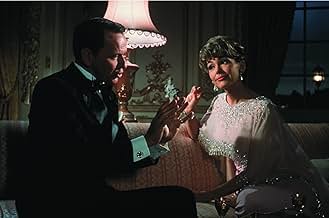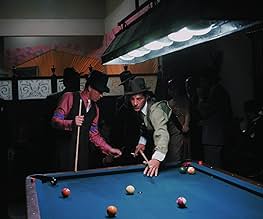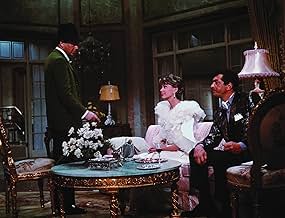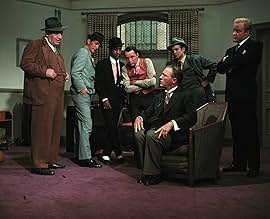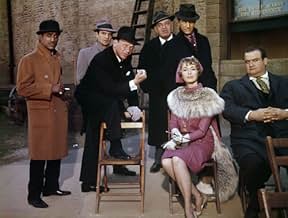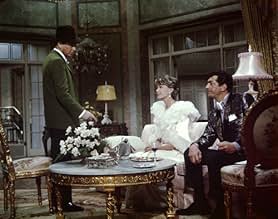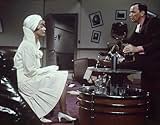In Prohibition-era Chicago, two rival gangs compete for control of the city's rackets.In Prohibition-era Chicago, two rival gangs compete for control of the city's rackets.In Prohibition-era Chicago, two rival gangs compete for control of the city's rackets.
- Nominated for 2 Oscars
- 6 nominations total
Jack La Rue
- Tomatoes
- (as Jack LaRue)
- Director
- Writer
- All cast & crew
- Production, box office & more at IMDbPro
6.46K
1
2
3
4
5
6
7
8
9
10
Featured reviews
Sinatra sings "My Kind of Town," and Sammy Davis Jr. interprets the peculiar 'Machine Gun' dance scene
After an emotional rendition of 'For He's a Jolly Good Fellow' number one gangster, Big Jim, is shot dead at his own birthday party, and Guy Gisborne (Peter Falk) takes over the mob
Robbo (Frank Sinatra), a rival gangster, warns Gisborne to stay out of the North Side John (Dean Martin), a minor hood from Indiana, joins Robbo's gang just before Robbo and Gisborne destroy each other's nightclubs Robbo rebuilds, outfitting his new gambling hall so that it becomes a new little modern casino at the touch of a button
Marian (Barbara Rush), Big Jim's daughter, gives Robbo $50 grand to kill her father's murderers, but he orders Will (Sammy Davis, Jr.), his aide, to donate the money to an orphanage Allan A. Dale (Bing Crosby), who runs the institution, crowns Robbo as a modern-day Robin Hood
The action takes place in the gangland Chicago of 1928 instead of Sherwood Forest Amusing ideas abounded The best being a brief appearance by Edward G. Robinson as the chief hood who is shot by the mob just few seconds in the film
Don't miss the formidable dance number "Style" performed and sung by Sinatra, Martin, and Crosby
Robbo (Frank Sinatra), a rival gangster, warns Gisborne to stay out of the North Side John (Dean Martin), a minor hood from Indiana, joins Robbo's gang just before Robbo and Gisborne destroy each other's nightclubs Robbo rebuilds, outfitting his new gambling hall so that it becomes a new little modern casino at the touch of a button
Marian (Barbara Rush), Big Jim's daughter, gives Robbo $50 grand to kill her father's murderers, but he orders Will (Sammy Davis, Jr.), his aide, to donate the money to an orphanage Allan A. Dale (Bing Crosby), who runs the institution, crowns Robbo as a modern-day Robin Hood
The action takes place in the gangland Chicago of 1928 instead of Sherwood Forest Amusing ideas abounded The best being a brief appearance by Edward G. Robinson as the chief hood who is shot by the mob just few seconds in the film
Don't miss the formidable dance number "Style" performed and sung by Sinatra, Martin, and Crosby
Tuneful, Light-hearted Prohibition-Era Robin Hood Spoof...
ROBIN AND THE 7 HOODS, last of the 'official' Rat Pack trilogy, was undeniably the best of the series (OCEAN'S ELEVEN, a glossy but ultimately standard 'B' movie about a Las Vegas casino heist had been filmed, between the Pack's nightclub appearances, in 1960, and SERGEANTS 3, a so-so comic Western cavalry remake of GUNGA DIN, appeared in 1963), and with tunes by the legendary Jimmy Van Heusen, it was the only film that gave it's legendary stars a chance to perform in the format best suited to them...an old-fashioned movie musical.
Set in Prohibition Chicago, the spoof of the Robin Hood legends offered Frank Sinatra as Robbo, favorite 'lieutenant' of murdered crime boss 'Big Jim' (unbilled Edward G. Robinson), who 'takes on' successor Guy Gisborne (a very funny Peter Falk) and his 'right-hand' man, Sheriff Alvin Potts (Victor Buono, also excellent), for control of the city. A likable gangster with a code of ethics, Robbo, and his pal, Will (Sammy Davis, Jr), are soon joined by 'new-in-town' grifter, Little John (Dean Martin), who easily beats Robbo in a game of pool (while harmonizing about being faithful to one's mother!). Meanwhile, a beautiful, mysterious woman (Barbara Rush) appears, introducing herself as Marian Stevens, with links to Big Jim, and an agenda of her own...
The arrival of milquetoast accountant Allen A. Dale (Bing Crosby, having a ball playing 'against type') with a scheme to turn public sentiment against Guy Gisborne and the Sheriff, through charity and 'good works', quickly brands Robbo as a hero who would steal from the rich to give to the poor, and Chicago adores him, driving Gisborne NUTS! As plots are hatched to discredit Robbo, body counts rise, and Marian proves the most duplicitous of all, in her quest to gain power.
While the plot summary doesn't sound particularly amusing, the film, with it's 'tongue-in-cheek' tone, is much closer in spirit to GUYS AND DOLLS than GOODFELLAS. With Sinatra, Crosby, Martin, and Davis crooning a rousing "Sit Down You're Rocking the Boat"-style mission number, "Mr. Booze", Davis singing and dancing to machine-gun volleys, and Sinatra performing what would become one of his 'signature' tunes, "Chicago (My Kind of Town)", the music is all first-rate, with the dramatic elements all played for laughs.
As Marian ends up with a surprising new 'mob boss', and Frank, Dino, and Sammy are reduced to pan-handling (but happy) "Santa Clauses", ROBIN AND THE 7 HOODS leaves viewers with a smile, and the Rat Pack with a film finally worthy of their considerable talents.
Not a bad legacy, at all!
Set in Prohibition Chicago, the spoof of the Robin Hood legends offered Frank Sinatra as Robbo, favorite 'lieutenant' of murdered crime boss 'Big Jim' (unbilled Edward G. Robinson), who 'takes on' successor Guy Gisborne (a very funny Peter Falk) and his 'right-hand' man, Sheriff Alvin Potts (Victor Buono, also excellent), for control of the city. A likable gangster with a code of ethics, Robbo, and his pal, Will (Sammy Davis, Jr), are soon joined by 'new-in-town' grifter, Little John (Dean Martin), who easily beats Robbo in a game of pool (while harmonizing about being faithful to one's mother!). Meanwhile, a beautiful, mysterious woman (Barbara Rush) appears, introducing herself as Marian Stevens, with links to Big Jim, and an agenda of her own...
The arrival of milquetoast accountant Allen A. Dale (Bing Crosby, having a ball playing 'against type') with a scheme to turn public sentiment against Guy Gisborne and the Sheriff, through charity and 'good works', quickly brands Robbo as a hero who would steal from the rich to give to the poor, and Chicago adores him, driving Gisborne NUTS! As plots are hatched to discredit Robbo, body counts rise, and Marian proves the most duplicitous of all, in her quest to gain power.
While the plot summary doesn't sound particularly amusing, the film, with it's 'tongue-in-cheek' tone, is much closer in spirit to GUYS AND DOLLS than GOODFELLAS. With Sinatra, Crosby, Martin, and Davis crooning a rousing "Sit Down You're Rocking the Boat"-style mission number, "Mr. Booze", Davis singing and dancing to machine-gun volleys, and Sinatra performing what would become one of his 'signature' tunes, "Chicago (My Kind of Town)", the music is all first-rate, with the dramatic elements all played for laughs.
As Marian ends up with a surprising new 'mob boss', and Frank, Dino, and Sammy are reduced to pan-handling (but happy) "Santa Clauses", ROBIN AND THE 7 HOODS leaves viewers with a smile, and the Rat Pack with a film finally worthy of their considerable talents.
Not a bad legacy, at all!
The Rat Pack Rules in this Riotous, Rousing, Romp!
Of all the five films they did together, the legendary Rat Pack never had a better cinematic vehicle for their talents than right here! You get the feeling, right from the start, that Frankie, Dino, Sammy, Bing, and Peter Falk weren't really acting. They were cutting loose, having a ball, and loving every minute of it. And you will, too! Not only are there the great Cahn - Van Heusen songs, including the Oscar-nominated "My Kind of Town," but there's the legendary William Daniels' excellent color photography, and Don Feld's period costumes. And, in addition to the aforementioned Rats, the performances of Barbara Rush as Marian (The script implies that her maidenly status was long since spoken for!), the underrated Robert Foulk as the corrupt Sheriff Glick, the always-funny Victor Buono as his even more nefarious Deputy, Alvin Potts, and the always funny veterans Hank Henry, Richard Bakalyan, and Phil Arnold as various lovable lowlifes.
A couple of sad footnotes connected with this film, though: The funeral scene for Edward G. Robinson's character was filmed in an actual cemetery. While there, Sinatra, whose tumultuous relations with the Kennedys were well known, came across an actual gravestone for a "John F. Kennedy, 1800 - 1878." They joked about it the rest of the day, and drew a lot of disapproving looks, until someone turned on a car radio on the afternoon of November 22, 1963! Another scene, which was never used in the finished film, was a kidnapping scene, filmed the same day as Frank Jr. was kidnapped. For a film to be entertaining and funny under these circumstances is nothing short of amazing, but "Robin and the Seven Hoods" manages to be, in the last of the Rat Pack films, and the best one of all of them!
A couple of sad footnotes connected with this film, though: The funeral scene for Edward G. Robinson's character was filmed in an actual cemetery. While there, Sinatra, whose tumultuous relations with the Kennedys were well known, came across an actual gravestone for a "John F. Kennedy, 1800 - 1878." They joked about it the rest of the day, and drew a lot of disapproving looks, until someone turned on a car radio on the afternoon of November 22, 1963! Another scene, which was never used in the finished film, was a kidnapping scene, filmed the same day as Frank Jr. was kidnapped. For a film to be entertaining and funny under these circumstances is nothing short of amazing, but "Robin and the Seven Hoods" manages to be, in the last of the Rat Pack films, and the best one of all of them!
ROBIN AND THE 7 HOODS (Gordon Douglas, 1964) ***
To begin with, I recall catching the opening sequence of this one as a kid on a now-defunct Sicilian TV channel Considered the best of the Rat Pack films, this is a slick, likable and witty transposition of the Robin Hood legend to gangland Chicago. A generally bright outing, it loses steam towards the end, emerging as being decidedly overlong.
The stars are in their element – Frank Sinatra is Robin (called Robbo and clearly relishing the role, it’s hard not to be reminded of the star’s real-life mob connections), Dean Martin is Little John (their famous initial confrontation takes place over a game of pool!), Sammy Davis Jr. (who does a fair imitation of James Cagney) is Will Scarlett and Bing Crosby turns up half-way through as Allen A. Dale (this proved to be his last musical role). As for the villains, Peter Falk is wonderful as Guy Gisbourne (though he seemed stuck in gangster types during this time in his career) and heavy-set cocoa-drinking Victor Buono is the new Sheriff. However, I think it was a mistake to present Marian (Barbara Rush) as a femme fatale; appropriately, then, Edward G. Robinson (an icon of the gangster genre) cameos as Big Jim – the Richard the Lionheart figure. There are also notable bits by Hans Conried (as Robbo’s put-upon architect), Allen Jenkins (as a disgruntled partner of Falk’s) and Sig Ruman (as a leading citizen).
Though OCEAN’S 11 (1960) did provide a title tune sung by Davis, this is the only Rat Pack musical of the lot. Sinatra’s “My Kind Of Town” was nominated for an Oscar – but other songs are actually more memorably presented: Davis’ own energetic destruction (at the rhythm of a tap dance) of Falk’s gambling joint; “Style”, a momentous collaboration between Sinatra, Martin and Crosby (three of the best-loved crooners ever); and Crosby’s show-stopping “Mr. Booze” (at one point, to divert a police raid organized by rival Falk, Robin’s gang turns the joint into an impromptu temperance meeting!). With this in mind, the film has definite black comedy touches – particularly in the cornerstone-laying motif. However, the Christmasy finale in which the tables are once again turned in favor of Robbo and Rush is reformed (off-screen) by Crosby feels rushed.
Some trivia connected to the film: a kidnapping scene was dropped for hitting too close to home – Sinatra’s own kid had just been abducted and eventually ransomed for $250,000!; on the day JFK was shot dead, the scene of Robinson’s funeral was being filmed!; apparently, Sinatra’s old musical pal Gene Kelly was originally involved in the production as a dance director but left during its early stages after disagreeing with Sinatra (who also served here as producer) over the number of dance routines to be incorporated into the film.
The stars are in their element – Frank Sinatra is Robin (called Robbo and clearly relishing the role, it’s hard not to be reminded of the star’s real-life mob connections), Dean Martin is Little John (their famous initial confrontation takes place over a game of pool!), Sammy Davis Jr. (who does a fair imitation of James Cagney) is Will Scarlett and Bing Crosby turns up half-way through as Allen A. Dale (this proved to be his last musical role). As for the villains, Peter Falk is wonderful as Guy Gisbourne (though he seemed stuck in gangster types during this time in his career) and heavy-set cocoa-drinking Victor Buono is the new Sheriff. However, I think it was a mistake to present Marian (Barbara Rush) as a femme fatale; appropriately, then, Edward G. Robinson (an icon of the gangster genre) cameos as Big Jim – the Richard the Lionheart figure. There are also notable bits by Hans Conried (as Robbo’s put-upon architect), Allen Jenkins (as a disgruntled partner of Falk’s) and Sig Ruman (as a leading citizen).
Though OCEAN’S 11 (1960) did provide a title tune sung by Davis, this is the only Rat Pack musical of the lot. Sinatra’s “My Kind Of Town” was nominated for an Oscar – but other songs are actually more memorably presented: Davis’ own energetic destruction (at the rhythm of a tap dance) of Falk’s gambling joint; “Style”, a momentous collaboration between Sinatra, Martin and Crosby (three of the best-loved crooners ever); and Crosby’s show-stopping “Mr. Booze” (at one point, to divert a police raid organized by rival Falk, Robin’s gang turns the joint into an impromptu temperance meeting!). With this in mind, the film has definite black comedy touches – particularly in the cornerstone-laying motif. However, the Christmasy finale in which the tables are once again turned in favor of Robbo and Rush is reformed (off-screen) by Crosby feels rushed.
Some trivia connected to the film: a kidnapping scene was dropped for hitting too close to home – Sinatra’s own kid had just been abducted and eventually ransomed for $250,000!; on the day JFK was shot dead, the scene of Robinson’s funeral was being filmed!; apparently, Sinatra’s old musical pal Gene Kelly was originally involved in the production as a dance director but left during its early stages after disagreeing with Sinatra (who also served here as producer) over the number of dance routines to be incorporated into the film.
Rat Packers spoof the Robin Hood legend, in Chicago!.
After Chicago mob boss Big Jim is gunned down on his birthday, shifty Guy Gisborne takes control of operations. But Big Jim's favourite man, Robbo, is having none of it, and along with his loyal North Side Crew and a drifter known as Little John, set about stopping Gisbourne and his corrupt government pals in their tracks.
Easily the best of the Rat Pack pictures, Robin And The 7 Hoods is a piece that is more befitting their respective talents. Containing great songs courtesy of Jimmy Van Heusen and Sammy Cahn, and boasting big time stars seemingly enjoying their respective roles, it is however a picture that possibly should be far far better. Perhaps it buckles under the weight of expectation with the names on show? Dean Martin, Frank Sinatra, Bing Crosby, Sammy Davis Jr and Peter Falk, now that is some roll call in star appeal, or maybe it called for a better director other than safe and steady, Gordon Douglas? But what we get is a mostly enjoyable experience that almost comes dangerously close to outstaying its welcome.
Personally to me it's a film that I rate higher than it deserves because I get such a kick out of watching these great entertainers enjoy themselves so much, Crosby and Falk in particular are having the time of their lives, with Crosby walking in and stealing the film from under the other's noses. There is also something special to me in a sequence as the gang ham it up gospel style for "Mr Booze", check out the looks on some of the guys faces, priceless cinema, whilst watching Old Blue Eyes sing "My Kind Of Town" will forever be a cherishable moment to me. There is a fair bit of interesting trivia attached to the picture which is readily available on this and many other internet sites, so I'll just move on a quickly surmise that Robin And The 7 Hoods should have been a classic, but for me personally I'll settle for hugely enjoyable. 7/10
Easily the best of the Rat Pack pictures, Robin And The 7 Hoods is a piece that is more befitting their respective talents. Containing great songs courtesy of Jimmy Van Heusen and Sammy Cahn, and boasting big time stars seemingly enjoying their respective roles, it is however a picture that possibly should be far far better. Perhaps it buckles under the weight of expectation with the names on show? Dean Martin, Frank Sinatra, Bing Crosby, Sammy Davis Jr and Peter Falk, now that is some roll call in star appeal, or maybe it called for a better director other than safe and steady, Gordon Douglas? But what we get is a mostly enjoyable experience that almost comes dangerously close to outstaying its welcome.
Personally to me it's a film that I rate higher than it deserves because I get such a kick out of watching these great entertainers enjoy themselves so much, Crosby and Falk in particular are having the time of their lives, with Crosby walking in and stealing the film from under the other's noses. There is also something special to me in a sequence as the gang ham it up gospel style for "Mr Booze", check out the looks on some of the guys faces, priceless cinema, whilst watching Old Blue Eyes sing "My Kind Of Town" will forever be a cherishable moment to me. There is a fair bit of interesting trivia attached to the picture which is readily available on this and many other internet sites, so I'll just move on a quickly surmise that Robin And The 7 Hoods should have been a classic, but for me personally I'll settle for hugely enjoyable. 7/10
Did you know
- TriviaOn the same day as the funeral scene was filmed, President John F. Kennedy (a personal friend of Frank Sinatra's) was assassinated.
- GoofsWhen the cornerstone for the police station is being dedicated, and again when the pretzel factory cornerstone is being dedicated, mountains can be seen over the rooftops of the buildings in the background. There are no mountains in Chicago.
- Quotes
Little John: When your opponent's sittin' there holding all aces, there's only one thing left to do: Kick over the table.
- ConnectionsFeatured in Bing Crosby: His Life and Legend (1978)
- SoundtracksMy Kind of Town
(uncredited)
Lyrics by Sammy Cahn
Music by Jimmy Van Heusen (as James Van Heusen)
Performed by Frank Sinatra
- How long is Robin and the 7 Hoods?Powered by Alexa
Details
- Release date
- Country of origin
- Language
- Also known as
- Robin Hood de Chicago
- Filming locations
- Rosedale Cemetary, Los Angeles, California, USA(cemetary scenes - now Angelus-Rosedale)
- Production companies
- See more company credits at IMDbPro
Box office
- Gross US & Canada
- $9,810,000
- Runtime
- 2h 3m(123 min)
- Aspect ratio
- 2.35 : 1
Contribute to this page
Suggest an edit or add missing content


